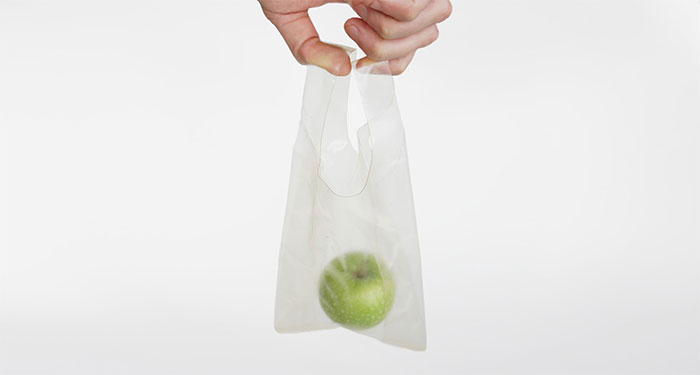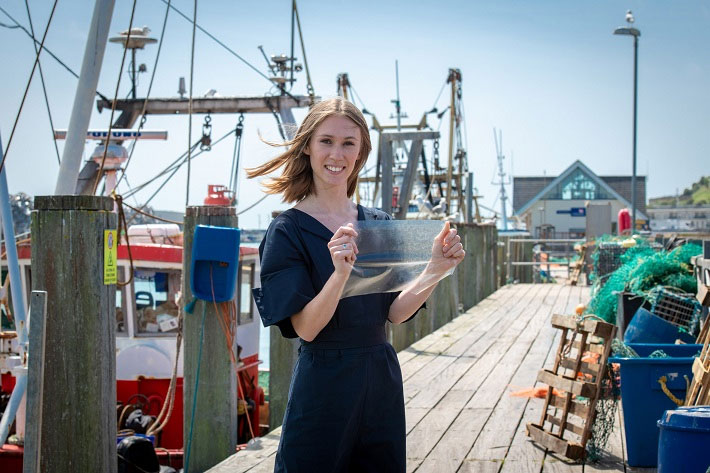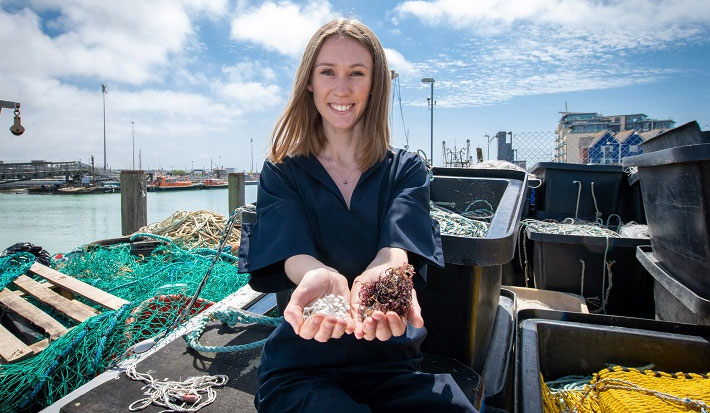Young girl preparing plastic bag that decomposes in a few weeks from skin and fish scales
Although it looks a lot like plastic, the initial test results show that it is tougher and stronger than normal plastic bags, and is safe for the environment.
Lucy Hughes, 23, has just graduated from the University of Sussex's product design field, has come up with an initiative that allows for the limited treatment of disposable plastics and by-products during fish processing, to create So, the material of plastic replacement packaging is environmentally friendly.

The product, called MarinaTex, is an environmentally friendly packaging made of skin and fish scales.
Her solution is a short-term biodegradable material called MarinaTex. This material can decompose in soil environment for 4-6 weeks, and when finished, can be disposed of with household food waste.

Lucy Hughes and her creative product.
Lucy shared: 'Plastics are a universal material, and so people have become so dependent on them. For me, using plastic to hold products that have a life cycle of less than a day is meaningless. '
Therefore, Lucy, living in the town of Twickenham in southwest London, used red algae to bind proteins extracted from the skin and scales , allowing the creation of stretchy, transparent material. Although it looks a lot like plastic, the initial test results show that it is tougher and stronger than normal plastic bags, and is safe for the environment.

Lucy used red algae to bind proteins extracted from the skin and fish scales, allowing the creation of stretchy, transparent material.
'To me, MarinaTex represents a commitment to an innovative, sustainable, highly localized material. As creators, we should not limit ourselves to designs that focus on design and functionality, but also need to make the product also imprinted personally, ' Lucy added.

Initial test results show that it is tougher and sturdier than normal plastic bags, and safe for the environment.
Lucy Hughes became the winner of the James Dyson Prize in the UK this year, with a prize of £ 2,000. This is an annual creative award for students who have useful inventions, close to life and inspire.
The initiative continues to reach the international category finals, with student representatives from more than 20 countries / regions participating. The name of the winner will be announced next November, and this time, the prize value of up to 30,000 pounds, an additional 5,000 pounds for the faculty at the candidate's school.

This material can decompose in soil environment for 4-6 weeks, and when finished, can be disposed of with household food waste.
On average each year in the UK, the process of handling fish produces up to 500,000 tons of by-products, including fish scales. MarinaTex is a solution to help limit this situation, because Lucy said, the scale and skin of a Atlantic cod has been enough to make up to 1,400 pieces of MarinaTex packaging.
'MarinaTex has shown one thing, that we do not need to sacrifice quality in exchange for sustainable choices , ' the young girl asserts.
- This bag is what will change the entire fight against plastic around the world
- From jelly powder, female students create 'plastic' bags that can dissolve in water
- The boy had skin flakes like fish scales
- New plastic material decomposes faster
- Alarm plastic trash appears in the fry
- Detection of wound healing of collagen in fish scales
- Why luminescent fish scales?
- The girl who used her hand to write letters on her skin felt like a miracle
- The scales are as hard as the armor of an Amazon arowana
- Detecting species of geckos stripped like fish, reddish like mice
- What effect does the viscous substance on fish have?
- Discovered that the Amazon fish have scales that can resist Piranha's predatory teeth
- Decomposing ocean plastic produces toxic chemicals
- Dogfish get tightened by plastic rings near their double ends
 Is the magnetic North Pole shift dangerous to humanity?
Is the magnetic North Pole shift dangerous to humanity? Washington legalizes the recycling of human bodies into fertilizer
Washington legalizes the recycling of human bodies into fertilizer Lightning stone - the mysterious guest
Lightning stone - the mysterious guest Stunned by the mysterious sunset, strange appearance
Stunned by the mysterious sunset, strange appearance